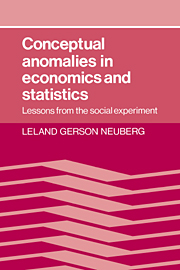Book contents
- Frontmatter
- Contents
- Preface
- Introduction
- PART I STATISTICAL LOGICS
- PART II ECONOMIC LOGICS
- Chapter 5 Problems with a rationalist account of classical mechanics
- Chapter 6 Microeconomics striving to be a classical-mechanics–like science
- Chapter 7 The income maintenance experiments: microeconomic science or scientism?
- Chapter 8 Microeconomics striving to be deontology
- Summary and conclusion of Part II
- Conclusion: Some possible barriers to controlled social experiments as science
- Appendix: Proofs of theorems, lemmas, and propositions
- References
- Symbols and abbreviations
- Index
Chapter 5 - Problems with a rationalist account of classical mechanics
Published online by Cambridge University Press: 16 February 2010
- Frontmatter
- Contents
- Preface
- Introduction
- PART I STATISTICAL LOGICS
- PART II ECONOMIC LOGICS
- Chapter 5 Problems with a rationalist account of classical mechanics
- Chapter 6 Microeconomics striving to be a classical-mechanics–like science
- Chapter 7 The income maintenance experiments: microeconomic science or scientism?
- Chapter 8 Microeconomics striving to be deontology
- Summary and conclusion of Part II
- Conclusion: Some possible barriers to controlled social experiments as science
- Appendix: Proofs of theorems, lemmas, and propositions
- References
- Symbols and abbreviations
- Index
Summary
Introduction: Some philosophers on the logic of science and classical mechanics
From Mill to Popper
Our ultimate aim in Part II is to understand the sense in which microeconomic studies such as the income maintenance experiments may perhaps be science experiments, or realizations of a rationalist program of social inquiry. To achieve that aim, it will help to first develop a concept of physical science with which to compare our income maintenance examples. Just as in Chapters 2 and 4 we focused on the logics of statistical inference, here we shall consider the logic of classical mechanics experiments. We develop our view of the logic of such experiments by distillation of the views of J. S. Mill, Karl Popper, and Thomas Kuhn on science generally and through close scrutiny of some examples from classical mechanics.
In explaining a feature of his Deductive Method, Mill offers an embryonic rationalist account of science:
… that of collating the conclusions of the ratiocination with the concrete phenomena themselves, or, when such are obtainable, with the empirical laws. The ground of confidence in any concrete deductive science is not the a priori reasoning itself, but the accordance between its results and those of observation a posteriori.
(1973, pp. 896–7)On Mill's account, then, one begins (at least on reconstruction) with a set of propositions, deduces some conclusions, and compares the deduced conclusions with observations or perhaps with observed regularities (= “empirical laws”). So on Mill's view, a science experiment seems unproblematic.
- Type
- Chapter
- Information
- Conceptual Anomalies in Economics and StatisticsLessons from the Social Experiment, pp. 119 - 149Publisher: Cambridge University PressPrint publication year: 1989



